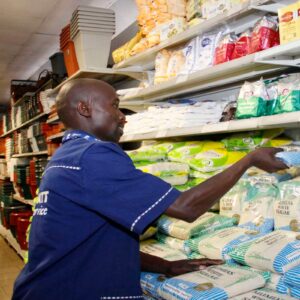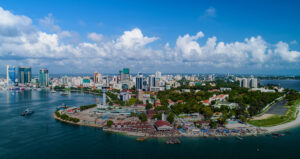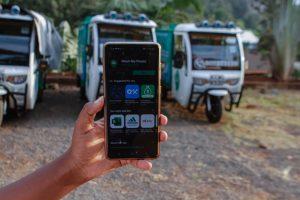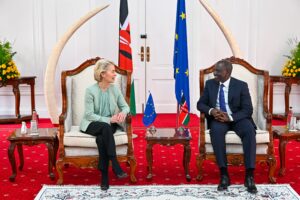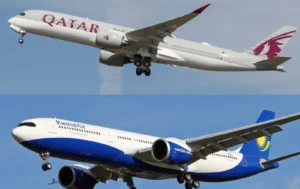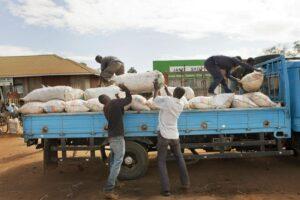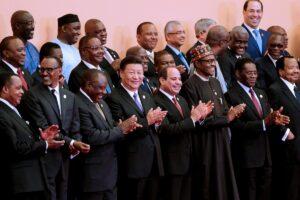- Africa’s new dawn: the rising role of digital and AI in agriculture
- Can Dangote Refinery Transform Africa Energy Ambition
- Gallup Survey: 80 per cent of Kenyan Workers Are Disengaged and Seek New Opportunities
- Madagascar Man Freed from 5KG Tumor After 15-Year Struggle
- How women in Africa are perceived and treated
- Sugar consumption in Kenya to Increase to 1.23 Million Tonnes
- Can Somalia and Turkey Oil deal Bring Change in Somaliland
- Remittances to Kenya dropped to $371.6 million in June, marking a six month low
Industry and Trade
- The construction took over 20 years and bears a processing capacity of 650,000 barrels per day 250,000 per day of gasoline and 100,000 of diesel.
- The Dangote oil refinery might halt the decades-long gasoline trade from Europe to Africa worth $17 billion each year.
Dangote Oil Refinery
Aliko Dangote, Nigeria’s and Africa’s wealthiest man ambition to foster energy reliance in his motherland and the region at large might be at risk. The giant oil refinery which is said to possess the potential to end decades-long gasoline trade from Europe to Africa worth $17 billion a year.
Concerns and tensions are high as a myriad of issues emerged before and since the $ 20 billion refinery came to life. According to various news reports, including the BBC and Reuters, the construction began in 2016 and started producing diesel and aviation fuel in January this year as petrol is expected to …
- Sugar consumption in Kenya is also expected to increase by 3.2 per cent this year driven by tourism and bakery
- Following the expiration of the ban in November 2023, production is expected to rebound significantly in 2024/25
- The survey also says that the growth in Kenya’s tourism sector will continue to create demand for sugar.
Kenya is expected to record a rise in sugar imports, as the effects of a ban on immature sugarcane processing kicks in, new findings have revealed. This is however expected to ease as millers ramp up their production
A report released by Fitch Solutions Company BMI and the United States Department of Agriculture shows that, the country should expect production to decrease by 32.9 per cent year on year in 2023/24 down to 530,000 tonnes from 790,000 tonnes in 2022/23.
This has majorly been attributed to the ban on sugarcane harvesting that was implemented in …
- According to the Turkish Energy Minister, Turkey will have exclusive rights for search and production when we find oil in these areas.
- Turkey and Somalia signed a defense and economic cooperation agreement during the Somali Defence minister’s visit to Ankara
- In March Somalia inked an oil and gas deal with Turkey which officials mentioned would foster cooperation in the exploration and exploitation of the deposits.
Somalia and Turkey Oil Deal
Despite being torn apart by civil war, Somalia’s geo-seismic studies have shown the war-torn country may have at least 30 billion barrels of oil and gas reserves.
Inching towards stability and fostering civil rest amid Islamic insurgents posing a threat to peace and harmony, Somalia’s newly discovered oil and gas deposits could be the nation’s breakthrough.
Although the resources take time to develop – exploration usually takes three to five years and production can only begin after the latter is …
- Lack of healthcare price controls has exposed those without insurance covers forcing them to part with billions to finance health.
- Health insurance schemes are increasingly gaining traction in countries like Rwanda helping to ease healthcare burden.
- The report further notes that countries like Kenya, Tanzania, and Uganda have faced challenges in implementing national health insurance schemes.
The lack of government-mandated price controls for out of pocket health expenditures has left a financial burden for low-income households in East Africa accessing medication, according to a new report.
The survey titled Primary Healthcare Financing in East Africa, shows that Out-of-Pocket (OOP) payments are the primary form of transactions in East Africa.
However, the trend poses a significant financial burden for poor families and households due to the lack of price controls on healthcare in the country.
The survey by Medic East Africa and Medlab East Africa shows that among the east …
- Africa’s blue and green economy is projected to be the new avenue that will drive investments in Africa
- The continent, with its vast coastline and rich marine resources, is poised to harness the immense potential of Africa’s blue and green economy
- According to ADFDB, 80 per cent of global trade is maritime. Oceans also provide billions of people with food, medicine, renewable energy, and natural resources.
Three Kenyan startups are among ten selected across the continent to benefit from $550,000 (Sh70.7 million) in capital to grow their operations towards boosting Africa’s blue and green economy sectors.
Kenya produced the highest number of startups on the list (three), followed by Rwanda with two. South Africa, Madagascar, Mozambique, Nigeria, and Tanzania each produced one enterprise.
From Kenya, Samaking, Plas Tech, and Ark will each receive $55,000 (Sh7.1 million) in funding to expand across Africa.
These ten ventures are part of the innovative, …
- The top unserved routes identified by Airbus are in Africa’s biggest cities, Nairobi, Lagos, Cape Town, Dakar, and Douala.
- Despite significant traffic between certain city pairs, Airbus notes that some of these routes lack regularly scheduled non-stop flights.
- Overall, Airbus forecasts a 4.1% growth in air traffic over the next 20 years, resulting in demand for 1,180 new aircraft by 2043 across Africa.
An analysis by global aviation giant Airbus has revealed several key unserved airline routes in Africa that could provide greater connectivity for travelers, and drive economic growth in the economies while offering fresh income streams for airlines.
Several of the top unserved routes identified in Airbus’ latest Global Market Forecast analysis are concentrated in Africa’s biggest cities, including Nairobi in Kenya, Lagos in Nigeria, Cape Town in South Africa, Dakar in Senegal, as well as Douala in Cameroon.
In its review, the aircraft maker also offered strategic …
- The EU-Kenya agreement will boost bilateral trade in goods, increase investment flows, and strengthen the ties between these partners.
- It is also expected to facilitate mutually advantageous economic relations sustainably, stimulating job creation and economic growth.
- The EU-Kenya EPA is the most ambitious deal negotiated with an African country in terms of sustainability and can serve as a template for other sustainable trade agreements.
The activation of the EU-Kenya Economic Partnership Agreement (EPA) on July 1st, 2024, marks a historic moment in the growing economic relations between Kenya and the European Union.
According to a statement from Kenya’s Ministry of Investments and Trade as well as the EU, this agreement is poised to greatly transform Kenya’s trade with Europe, opening doors for Kenyan exporters to access duty-free the opportunities set by the $18 trillion bloc.
“The EPA will also create more opportunities for Kenyan businesses and exporters, as it will …
- How Niger-Benin dispute mar $400 Million oil exports deal with China
- Tensions between neighbouring West African nations Benin and Niger are escalating amid a deepening dispute over oil exports.
- Further, Niger accused Benin of kidnapping five of its nationals.
Niger-Benin dispute
Peace in West Africa is becoming scarce as Niger and Benin dispute takes a different shift forcing Niger to consider routing its crude oil pipeline (1,930 kilometer) stretching from Agadem oil field to the port of Cotonous in Benin.
Niger’s ambition to become an oil exporting nation is threatened by internal security crisis and a diplomatic dispute with neighbor Benin. The conflict is a product of last year’s coup that toppled the West African nation’s democratic government.
According to information from Africa News, It was designed to help the oil-rich but landlocked Niger achieve an almost fivefold increase in oil production through a $400 million deal signed in April …
- Kenyan consumers defy 8-year high Lending Rate as 60 per cent set sights on borrowing over the next year
- Nearly all consumers (99 per cent) deem access to credit as essential for financial inclusion and economic participation
- Digital platform usage is increasing, with 42 per cent of Kenyans conducting at least half of their transactions online.
Kenyan households experienced a modest financial rebound in the second quarter of 2024, largely driven by new business ventures, enhanced debt management, and less impact from job losses. This is according to the second quarter Consumer Pulse Study by insights company TransUnion.
According to the study, 34 per cent of consumers saw an increase in income in the last three months, led by gains among the Gen Z (18–26 years old) and Millennial (27–42 years old) groups.
While a similar number (36 per cent) of consumers also reported a decrease in income over the …






